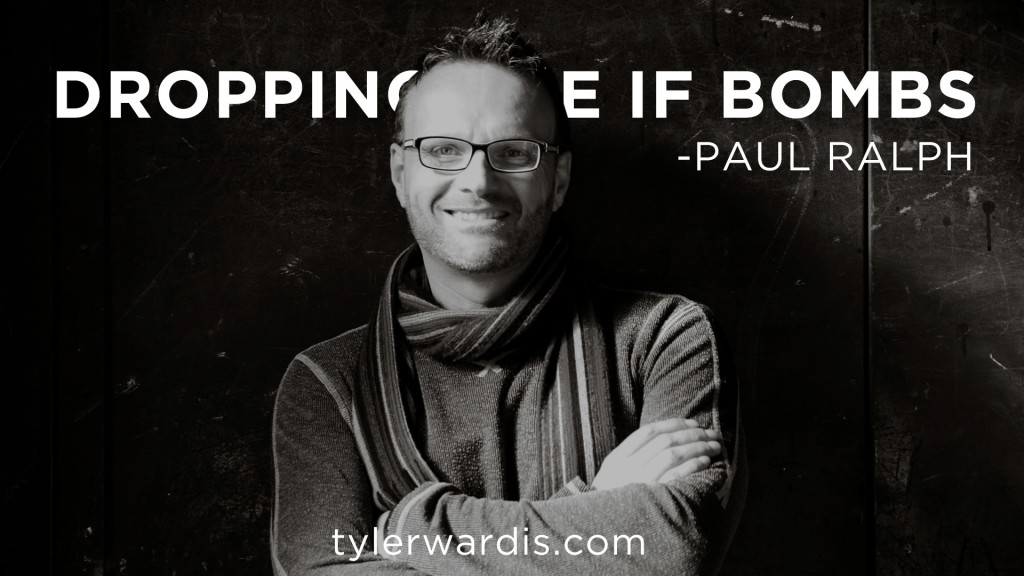Paul Edward Ralph has three first names. Odd, we know. But hey, he’s a Canadian. He’s also a long time friend and a man with brilliant perspective to share with the world. (Learn more about PER here)
I recently asked Paul to contribute to Marriage Hacks (a free eBook I’m giving away here) and his advice to young married’s is too good not to share.
Hope it helps!
Enter Paul.
If-bombs are just like F-bombs, except there’s way more collateral damage.
I will never forget my earliest If-bomb encounter. You see, there was a certain young lady I’d been eyeing for months at school and church. Having honed my skills for reading the nonverbal cues of the fairer sex, it was abundantly clear that there was mutual interest.
I was fourteen. There could be no mistaking it. This was a slam-dunk.
On that magical day, as Jill and I stood at the bus stop, I mustered up the courage. Leaning toward her, and lowering my voice to an adolescent hush, I artfully posited the question: “Would you like to go with me to a movie?”
“Sure,” she responded instantly.
And with the sweet sound of that monosyllabic ecstasy ringing fresh in my ear, my mind raced to the shared popcorn and to the potential of nudging my leg closer to hers. I even let myself consider the rapturous delight of holding her hand.
“Sure,” she repeated, “If you’ll introduce me to your older brother!”
Crash and burn.
I was crushed.
I was completely humiliated.
I was irreparably damaged.
And I was fourteen.
There was nothing more deflating in the entire universe.
When my heart and mind finally coalesced around the brutal nature of her rejection, I determined then and there to be suspect of that little conjunction “if.” And the devastation wrought when dropped on an unsuspecting victim is enormous.
Fast forward.
I married my high school sweetheart (not the bus stop bomber) and we’ve introduced three new lives onto the big, blue marble. If I’m honest, not every breath has been dramatic, effortless, and filled with pregnant anticipation. Marian and I have celebrated the triumph and the tragedy; the pleasure and the pain; the daylight and the darkness.
We’ve dropped our share of bombs on each other. And the fallout wasn’t pretty. Yet through it all, among other things we’ve learned to say: Thank you, You’re correct, I’m sorry—and mean it.
I like the ancient Hebrew description of it:
… a man leaves his father and mother and is united to his wife, becoming one flesh—no longer two but one.
Perhaps I now perpetually have that look on my face, but I’m often asked, “What piece of advice would you give to couples?” That’s a decent question, but I liked this question better when it recently landed in my inbox: “What advice would you offer twenty-something newlyweds (or couples about to take the plunge)?”
Here’s one, which might surprise you…
Stop dropping If-bombs!
“If” has many uses. When it’s employed as a part of couple-speak, especially during moments of tension, unfortunately it often presents as:
“IF” CAN BE A BARGAINING CHIP.
Him: “If she puts out, I’ll help around the house.”
Her: “If he helps out more, I might want to have sex with him.”
“IF” CAN BE A COVER-UP FOR FEAR.
Him: “If she really knew what I was like, she’d reject me.”
Her: “If I gain weight, he’ll look elsewhere.”
“IF” CAN BE A BLAME GAME.
Him: “If she weren’t such a nag, we’d be happy.”
Her: “If he didn’t waste so much money, we wouldn’t be in this mess.”
Does any of this sound familiar?
If-bombs place people in competitive postures against one another. And since the DNA of competition requires that there be a winner and a loser, as a couple that translates into “me versus you—one or both of us loses.
In other words, when you compete with one another—when you insist on dropping if-bombs—you set yourself up for failure as a couple.
Several years into our marriage, I found myself at a career tipping point, which caused me to doubt some long-held ideals. I was nervous to have an open dialogue with Marian about them. I was nervous she might reject the new direction I was considering; ergo, reject me.
Can you say collateral damage?
In retrospect, the particular issue wasn’t even a big deal. But I let it slip into “me versus her.” Subconsciously. Unintentionally. Painfully. So I hid from my own wife, which meant that both of us were losing.
Should you choose to leverage If-bombs as bargaining chips, or cover-ups for fear, or to blame your spouse, I’ve got some hard news for you: You might just find that your shared millions of breaths will develop into a lifetime of very labored breathing with the odds stacked against you.
Permit me to suggest an alternative…
“Us versus the distractions—with a chance that we’ll both win.”
DISTRACTIONS: A PARTIAL LISTING…
Money, Death, Employment, Children, Sickness, Attraction to Others, Aging Parents, Sex, Religion, Power, Friends, Personal Baggage, Extended Family, Cultural Distinctions, Personal Habits, Society, Pizza Toppings (okay kidding, kind of)
Distractions are natural. They’re coming whether you like it or not. They happen with or without your permission. And in reality, you often play a role in creating the very distractions you will encounter as a couple.
Distractions are powerful. They can kill your marriage. But they don’t have to.
If it’s “me versus you,” there is an enormous need, perceived or real, to come out on top. (Self-preservation is like a horse that has bolted from the barn—quickly escaping and very difficult to retrieve. And it kicks up a lot of dust in the form of arguments, misrepresentation, misunderstanding, and hurt.)
On the contrary, “us versus the distractions” animates your relationship and conversations center around the topic at hand, rather than the persons involved. This opens up the freedom for some healthy discussion, which doesn’t need to include personal attacks.
To paraphrase a dear friend of mine,
Tough issues can make us fearful or defensive. However, a good conversation does not dismiss another’s viewpoint. A healthy conversation is open and honest. Each person seeks to give and receive, and each has a genuine interest in the perspective and knowledge of the other person.
Now that is what an “us versus the distractions” kind of relationship looks like. And that’s what can happen when you stop dropping If-bombs.
-
Ramona Wilson Beasley
-
http://www.life-signatures.com Lawrence Namale
-
http://www.life-signatures.com Lawrence Namale
-
udit0567
-
Shawn
-
FLORIDA
-
Ramona Wilson Beasley
-
James Tonn
-
http://rkblog.com/ Rich Kirkpatrick
-
Paul Edward Ralph
-
Paul Edward Ralph
-
Paul Edward Ralph
-
Paul Edward Ralph
-
Paul Edward Ralph
-
Zeena Martinez
-
Paul Edward Ralph
-
Zeena Martinez
-
Paul Edward Ralph
-
B
-
Paul Edward Ralph

